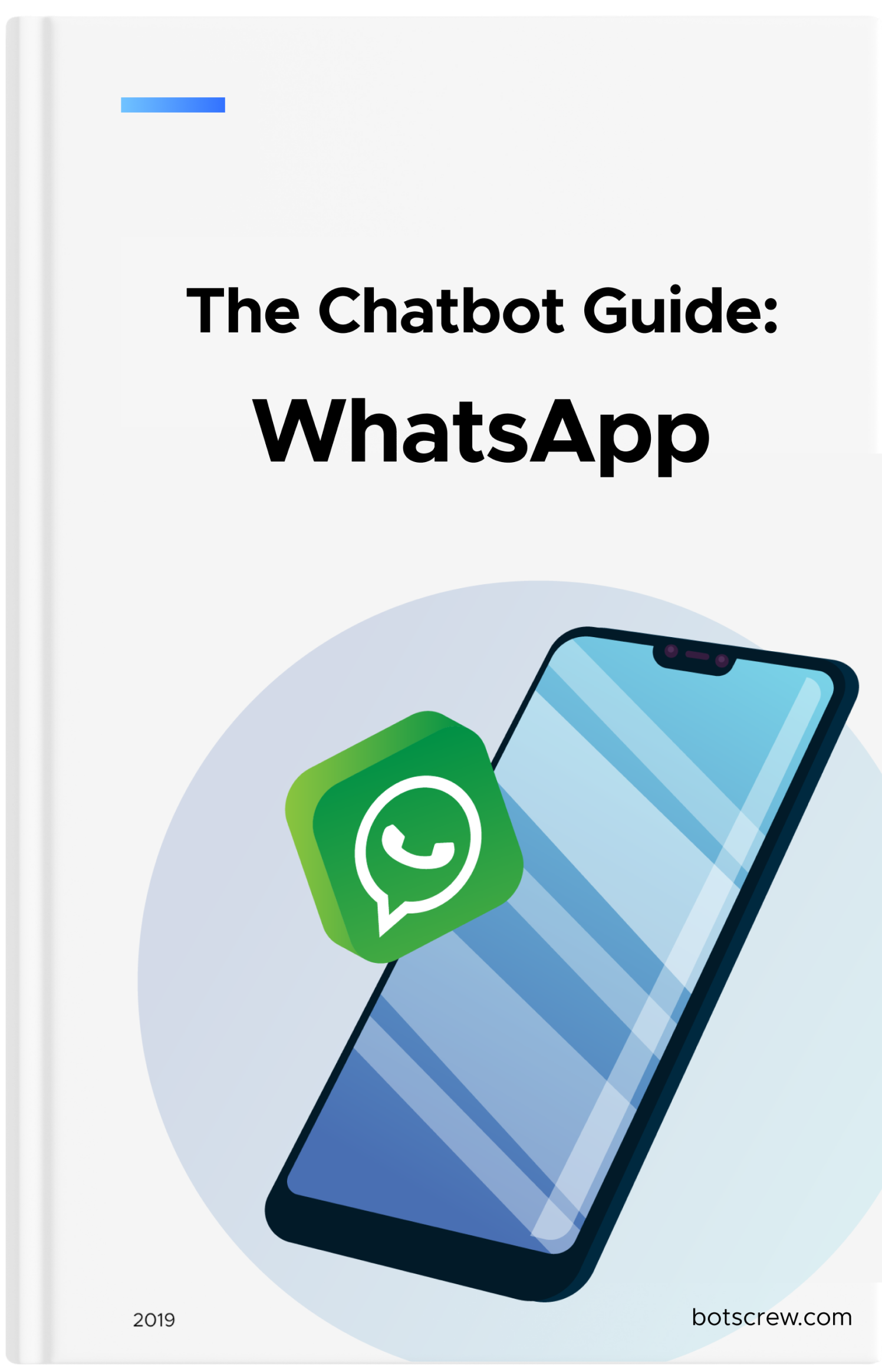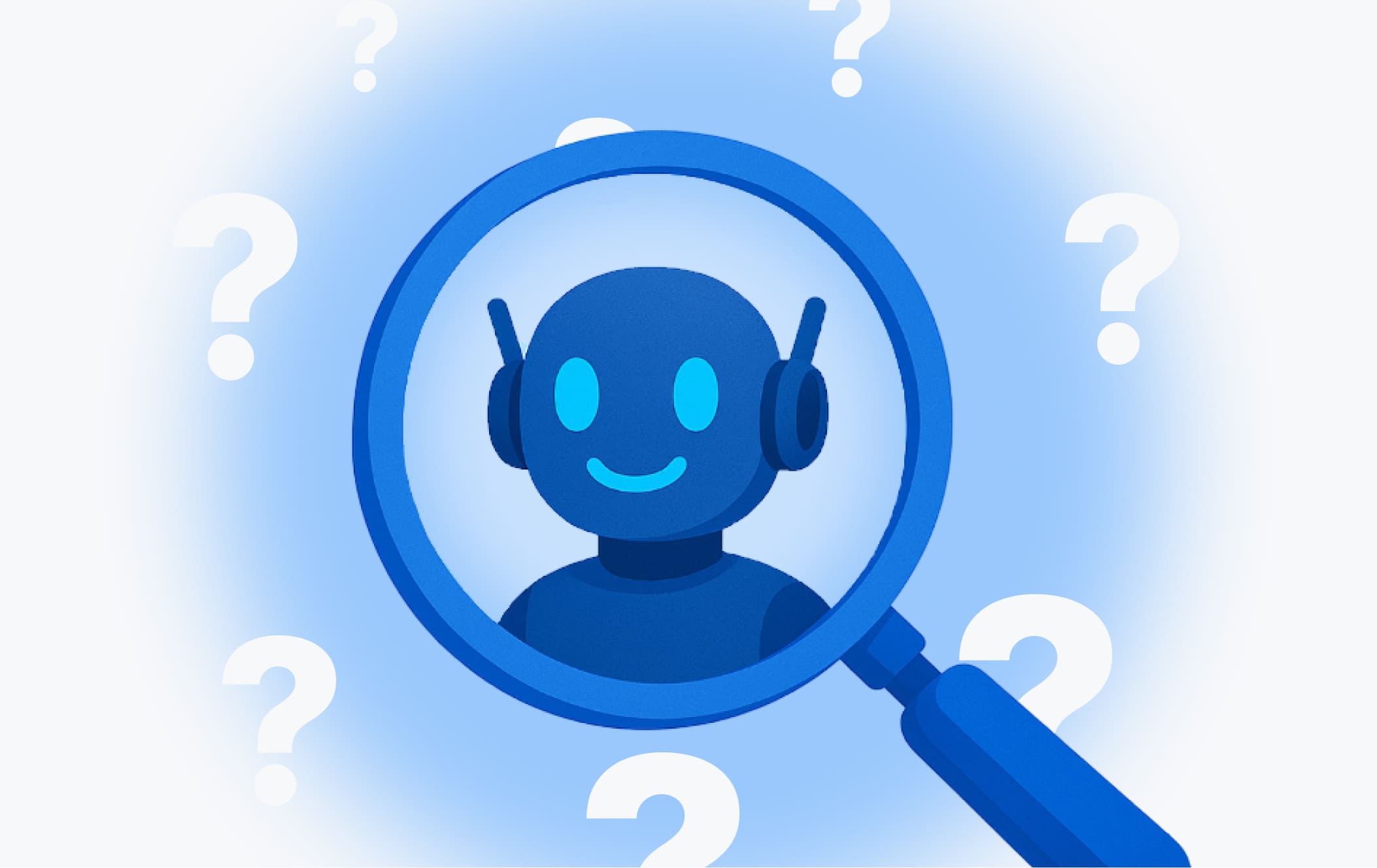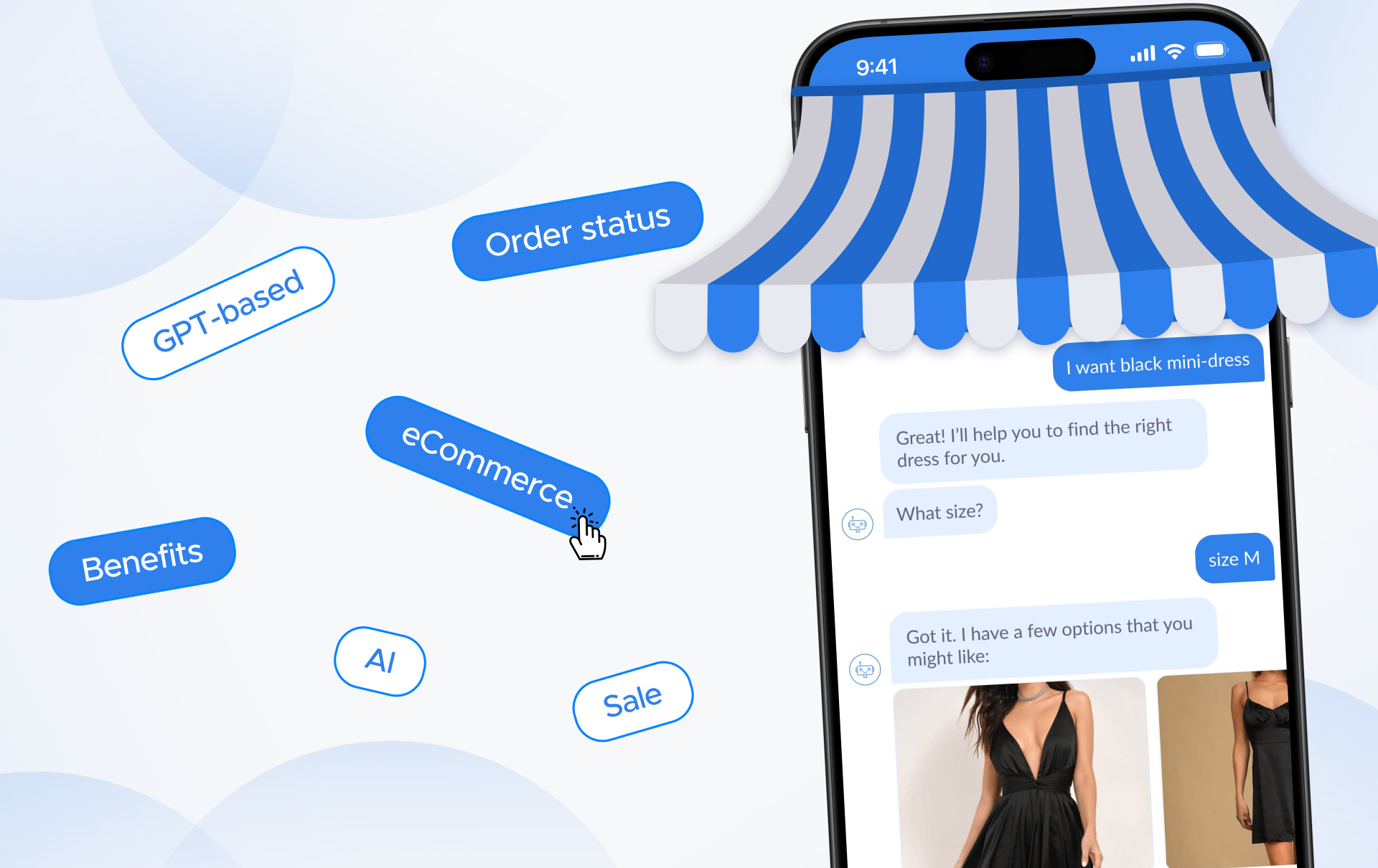AI in Travel and Hospitality: Transforming the Guest Experience
What's shaping the future of travel? AI in travel and hospitality is transforming how the industry designs experiences, paving the way for smarter journeys and sustainable growth.
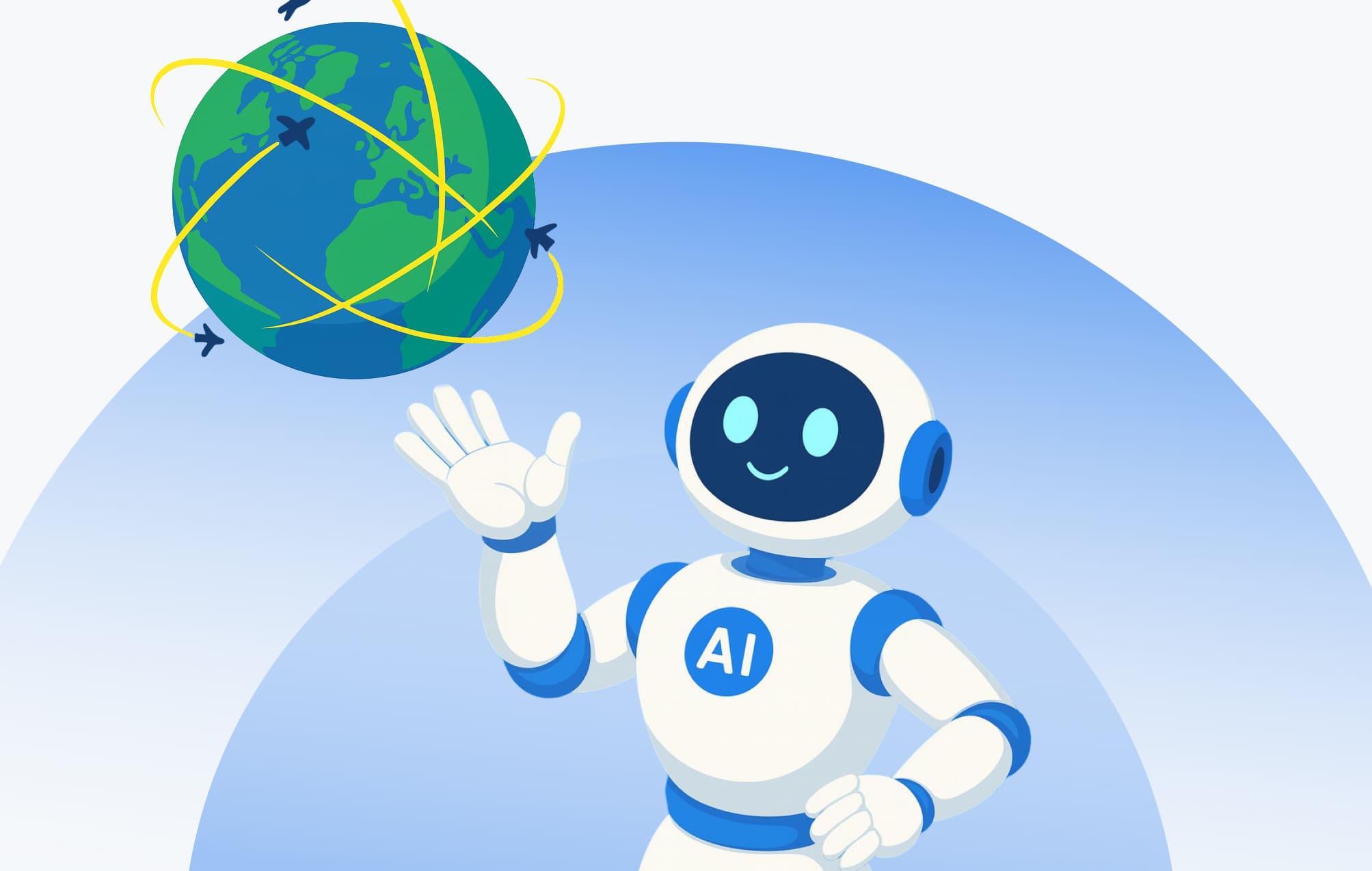
Picture this: you step off a long-haul flight. Instead of waiting in line at the front desk, you head straight to your room — no check-in hassle, no paperwork. All thanks to AI in travel and hospitality. The hotel's travel AI chatbot has already verified your identity, checked you in, and picked the perfect room based on your preferences.
This level of seamless, hyper-personalized travel isn't a distant dream — it is happening now. And with 72% of businesses already experimenting with AI, embracing this technology is quickly becoming essential to stay competitive.
AI is redefining the way the travel industry operates:
— Personalization that feels human. AI tailors every step of the journey to individual preferences and behaviors.
— Smarter pricing strategies. Dynamic pricing powered by real-time market trends and customer insights.
— Always-on support. Virtual assistants and chatbots handle bookings and queries 24/7.
— Secure and efficient. Facial recognition, fraud detection, and streamlined identity verification.
In this guide, you'll discover:
✅ How leading travel businesses are using AI to deliver exceptional results
✅ How you can automate processes to stay ahead in the tourism sector
✅ AI adoption roadblocks— and how to break through them
✅ How BotsCrew can help you unlock AI's full potential.
What Smart Tourism Is — and Why We Are Not There Yet
Travel should be exciting — but for many companies, delivering a seamless journey remains a major challenge. Here's what a typical traveler's journey looks like today — and where it falls apart at every stage with the business impact at each step:
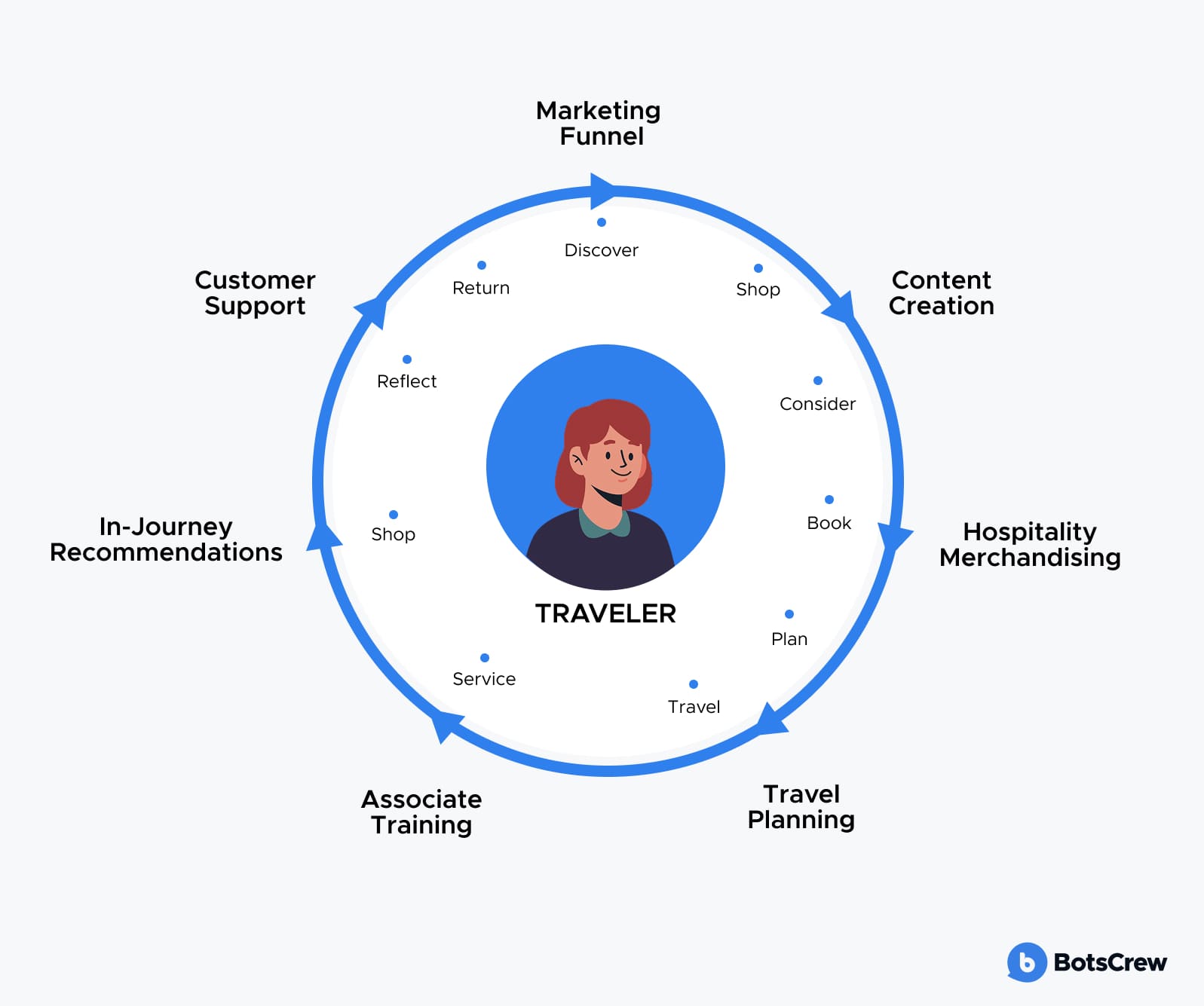
Step 1: The Search Begins
Customers start exploring options, yet most marketing and search efforts feel generic. Ads often miss the mark because there is no real understanding of whether someone is a foodie, an adventurer, or a beach-seeker. Potential clients open multiple tabs comparing options — and many never return.
💰 Business impact: High drop-off rates, wasted marketing spend, low lead conversion.
Step 2: Information Overload
Websites are cluttered, images are overly staged, and descriptions fail to answer basic questions. Reviews are inconsistent, leaving customers uncertain about your offerings.
💔 Business impact: Decreased trust, lower engagement, higher abandonment rates.
Step 3: Booking Pain
Booking is rarely frictionless. Endless forms, repeated data entry, and hidden fees right before payment frustrate customers. Coordinating flights, hotels, and transfers multiplies the complexity. Travelers often struggle with roaming and connectivity issues, switching eSIM cards or fighting with airport Wi-Fi to access booking confirmations.
🛒 Business impact: Reduced conversion, abandoned carts, and lost revenue opportunities.
Step 4: Service Gaps
Customers encounter slow responses, inconsistent information, or support in the wrong language. Experiences feel generic rather than tailored.
🙅 Business impact: Poor satisfaction scores, negative reviews, and lower repeat bookings.
Step 5: The Trip Itself
Customers face delays on check-in, rooms that sometimes don't meet expectations, and difficulty finding local recommendations. Time is spent resolving issues instead of enjoying the trip.
😫 Business impact: High operational costs for problem resolution, decreased customer loyalty, and missed upselling opportunities.
Step 6: Support (or Often the Lack of It)
Help is slow or unavailable, often limited by language or communication channels. Customers feel stranded rather than supported.
👎 Business impact: Increased complaints, lost advocacy, and lower lifetime value.
All these pain points can be addressed with AI and smart technology:
- Personalized offers and recommendations
- AI travel chatbots for instant support, bookings, and guidance — available 24/7 in multiple languages
- Transparent dynamic pricing
- Seamless check-in via mobile apps or facial recognition
- Real-time personalized tips based on location and weather.
Without AI:
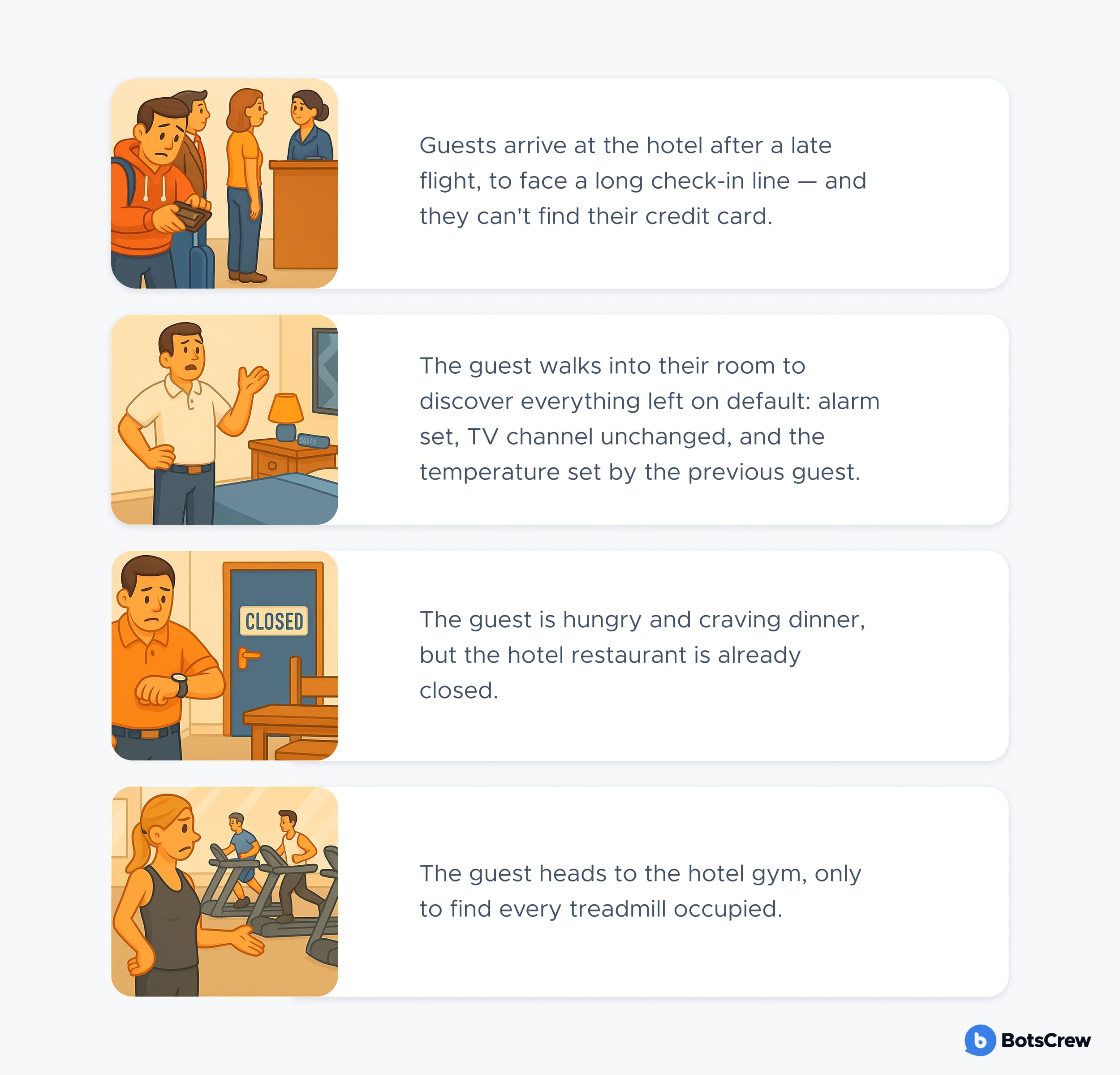
With AI:
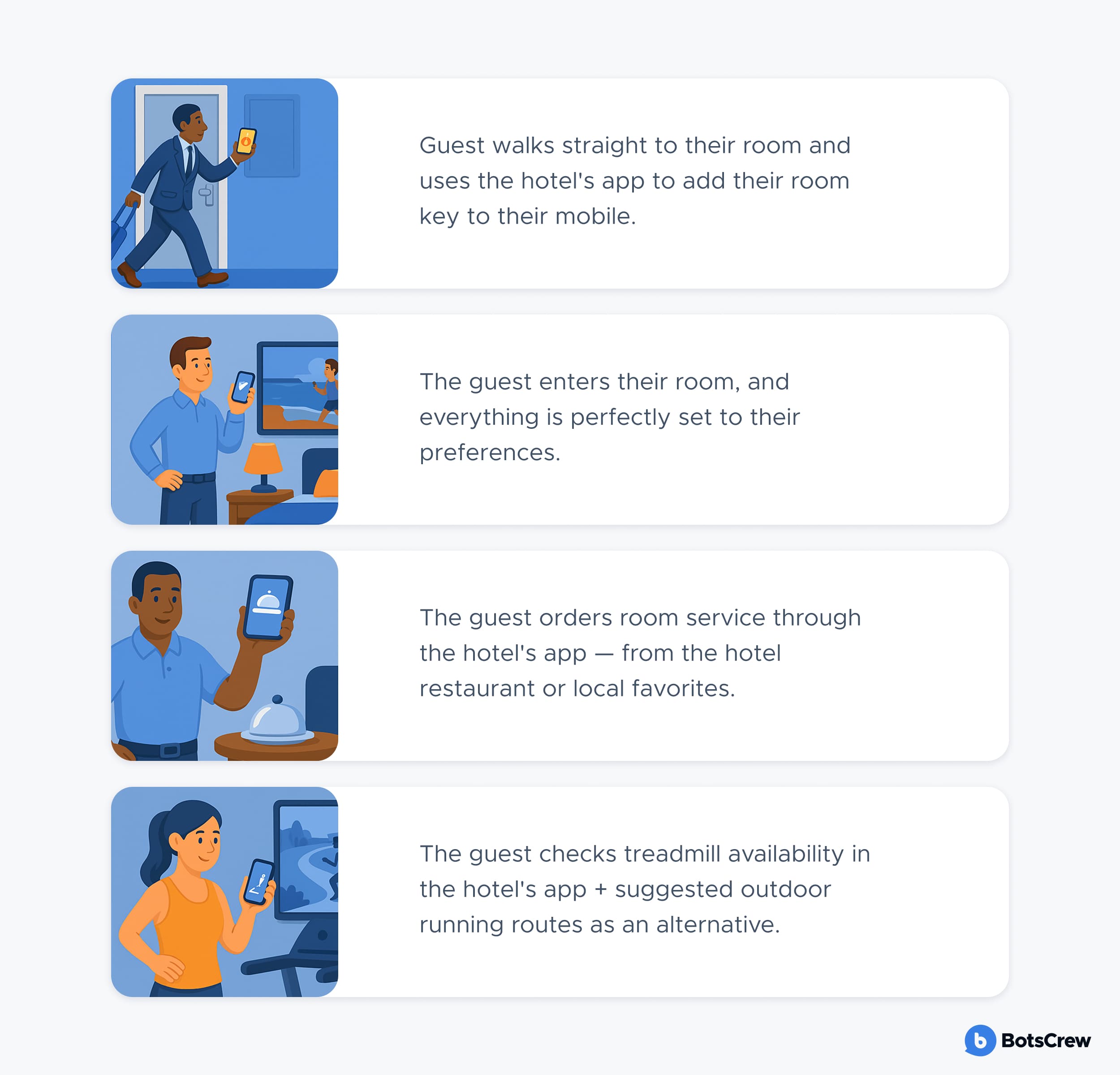
This is what smart tourism looks like: journeys that are effortless, personalized, and stress-free. Customer expectations are higher than ever, and patience is running out. Yet the desire to travel remains strong — McKinsey's ConsumerWise Sentiment Survey shows that nearly 1 in 3 consumers plan to splurge on travel in the next months.
By leveraging both proven and emerging technologies, travel companies can bridge the gap between the promise of a great journey and the reality travelers experience today.
Wait! Did you know we offer a FREE 30-minute AI consultation? Got a project in mind? Let's make it happen.
From Booking to Boarding: AI in Travel and Hospitality with Real-World Examples
Let's explore real-world AI use cases across the travel and hospitality industry, showing how smart algorithms are eliminating friction, optimizing revenue, and creating the kind of personalized journeys travelers crave.
AI Assistants For Travel Booking
Intelligent travel chatbots now act as personal travel agents, available on platforms like Facebook Messenger, WhatsApp, Viber, and the website, delivering a more seamless and personalized booking experience. Travel giants such as Booking.com, Skyscanner, and Expedia are already leveraging these chatbots in hospitality. Users start by entering the details of their trip, and the AI scans booking sites to find the best deals.
Take Skyscanner as an example: activate its travel AI chatbot on Facebook or WhatsApp, type in your destination — or even just “anywhere” if you are open to suggestions — and the bot will provide options with real-time pricing.
Enter your travel dates, and it will show the cheapest flights, then redirect you to the Skyscanner website to finalize your booking. The bot can also send price alerts, keeping travelers informed effortlessly. By February 2018, Skyscanner reported over 1M interactions with its chatbot, highlighting the growing popularity of AI-powered travel assistants.
During the COVID-19 pandemic, tourism and hospitality were among the hardest-hit industries. Choose Chicago, the official destination marketing organization for Chicago, wanted to reopen safely and attract visitors back, focusing on digital solutions to engage people while they stayed home.
We developed a travel AI chatbot The Bean (named after the iconic Cloud Gate sculpture in Millennium Park) that acts as a virtual city ambassador. It answers visitor questions, suggests attractions, events, and restaurants, and keeps users informed about seasonal festivals and special events.
Key features:
- Search for events, attractions, restaurants, and cuisine
- Access recent blog posts and COVID-19 regulations
- Filter results by category (e.g., virtual events, sports, music), location, or cuisine type
- Assist with trip planning, including hotel bookings and city transport maps.
Impact (Aug 2021 – Sep 2022): 139,883 users engaged with The Bean, 90.34% success rate: users found what they were looking for. The AI-powered virtual assistant covers 60+ topics, from activities to dining.
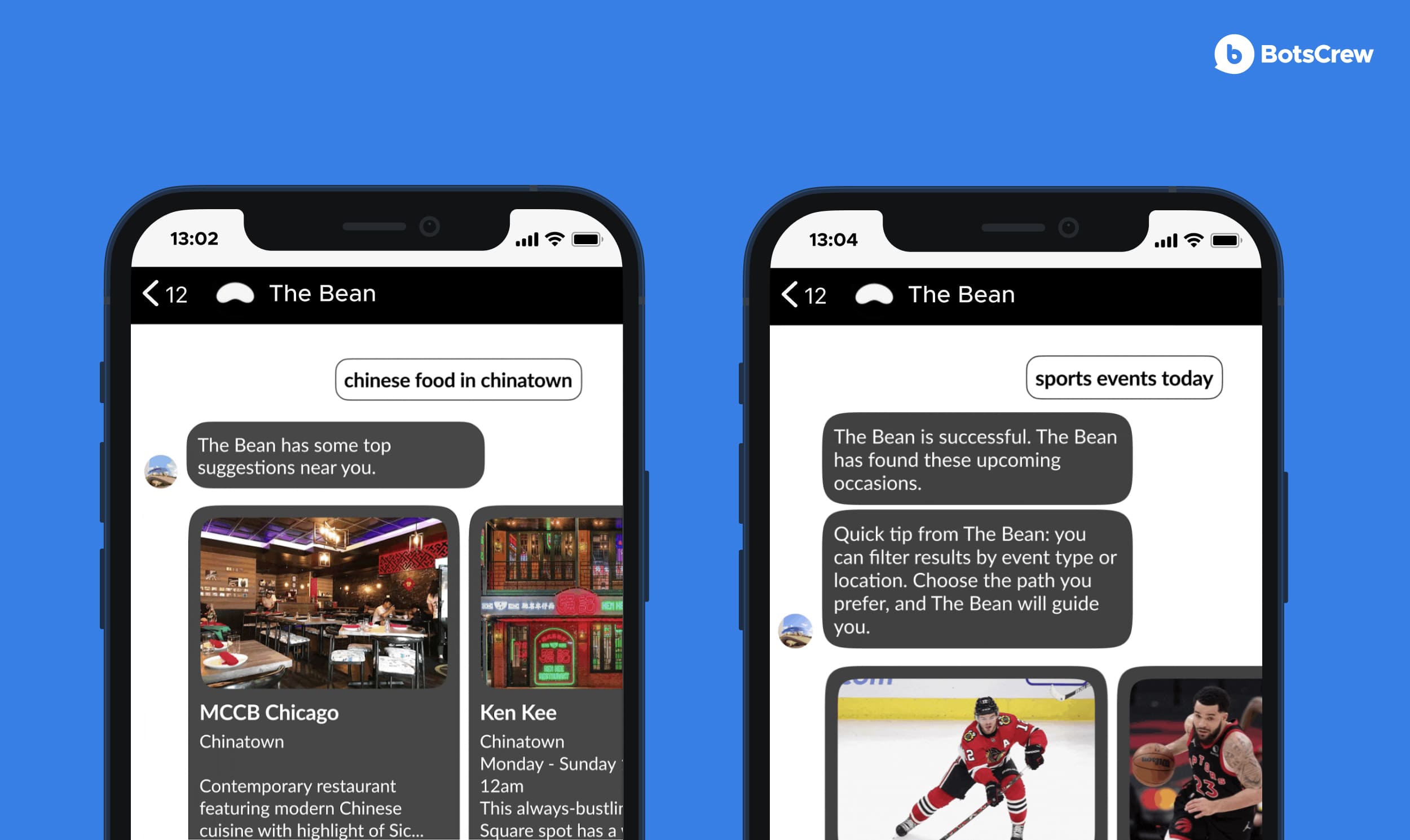
AI-Driven Personalization for Travelers
By analyzing guest preferences, historical behavior, and contextual data, conversational AI in hospitality can suggest services, activities, or nearby attractions perfectly aligned with each guest's interests.
One standout application is pre-arrival personalization. AI collects behavioral and preference data before the guest checks in, enabling hotels to offer tailored experiences from day one. Google Travel uses AI to analyze user search history, location data, and past bookings to provide personalized hotel, flight, and activity recommendations.
And the best part: you transform the classic walking tours into AI-powered, gamified experiences. That's exactly what we did collaborating with a London-based innovator (NDA). The goal was to help city explorers discover hidden culinary gems while having fun with friends, without wasting time or money on the wrong spots.
How the solution works:
— Gather your squad. Teams of 2–5 choose a food-filled adventure. Dietary preferences can be checked in advance.
— Choose your tour. Select a journey based on your favorite cuisine or theme.
— Book & begin. Receive a confirmation email with a WhatsApp link to start the hunt.
— Start the adventure. Follow the bot's riddles and clues through London's streets, timed to challenge and excite.
— Solve, eat, conquer. Unlock food stops, enjoy included dishes, and complete the maze. The bot tracks your progress and timing, adding a competitive twist.
The WhatsApp AI travel chatbot now guides teams through puzzles, hints, and directions, creating a fully immersive, interactive culinary experience. Recognized by TripAdvisor as one of the top 10% of things to do worldwide, the solution combines AI, gamification, and city exploration to create a unique way to discover London's hidden food treasures.
Our approach focuses on conversational design, seamless UX, and AI-driven recommendations that adapt to users' preferences, even understanding typos or informal queries.
For instance, in the Virgin Holidays project, we developed a Messenger chatbot, “Cali-bot,” with a friendly, Californian-inspired personality. It guided users through selecting and purchasing limited-time experiences, leveraging a conversational flow enriched with emojis and GIFs.
By combining intuitive interaction design with smart recommendation logic, the travel chatbot maximized engagement, sold out all available experiences, and contributed to the success of the “Screw It, Let's Do It” campaign.
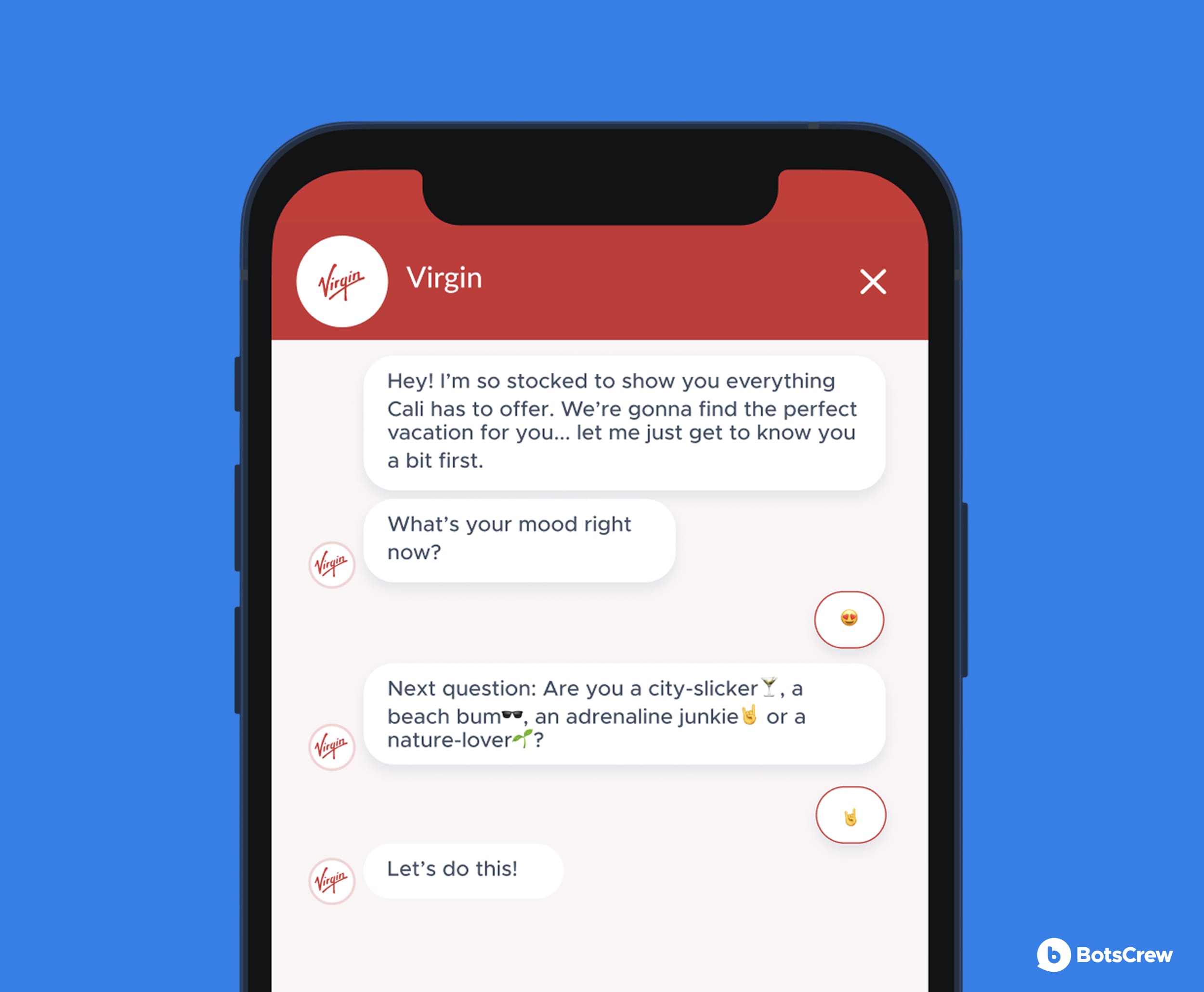
Automated Itinerary Planning
Planning a trip can feel overwhelming — AI is turning that challenge into a seamless experience. Instead of spending hours researching destinations, comparing schedules, and mapping routes, travelers can now rely on AI-powered itinerary planners to handle it all.
These tools recommend must-visit attractions, optimize routes, and design detailed travel schedules based on personal preferences, budget, and real-time factors like weather, traffic, and even local events. If a flight is delayed or an attraction suddenly closes, the itinerary automatically updates, ensuring a stress-free journey. For example, TripAdvisor's AI trip planner creates personalized itineraries with curated hotels, activities, and dining suggestions, making every trip as unique as the traveler.
We've been engaged in creating a bilingual AI chatbot for travel for a platform that helps travelers discover and book experiences — from skip-the-line tickets to bespoke tours — across 70 countries. The chatbot, available on Facebook in English and Italian, allows users to:
- Find attractions: Ask “Best coffee in Paris?” and get curated suggestions, even with typos.
- Check weather: After finding an attraction, users can also check the local weather to plan their visit accordingly.
Musement Bot became one of the first chatbots in the travel industry in 2016, helping travelers discover activities, enjoy seamless booking, and explore cities with confidence. It demonstrated how the AI-powered chatbot for the travel industry and more complex solutions can improve customer engagement, streamline the booking process, and support international expansion.
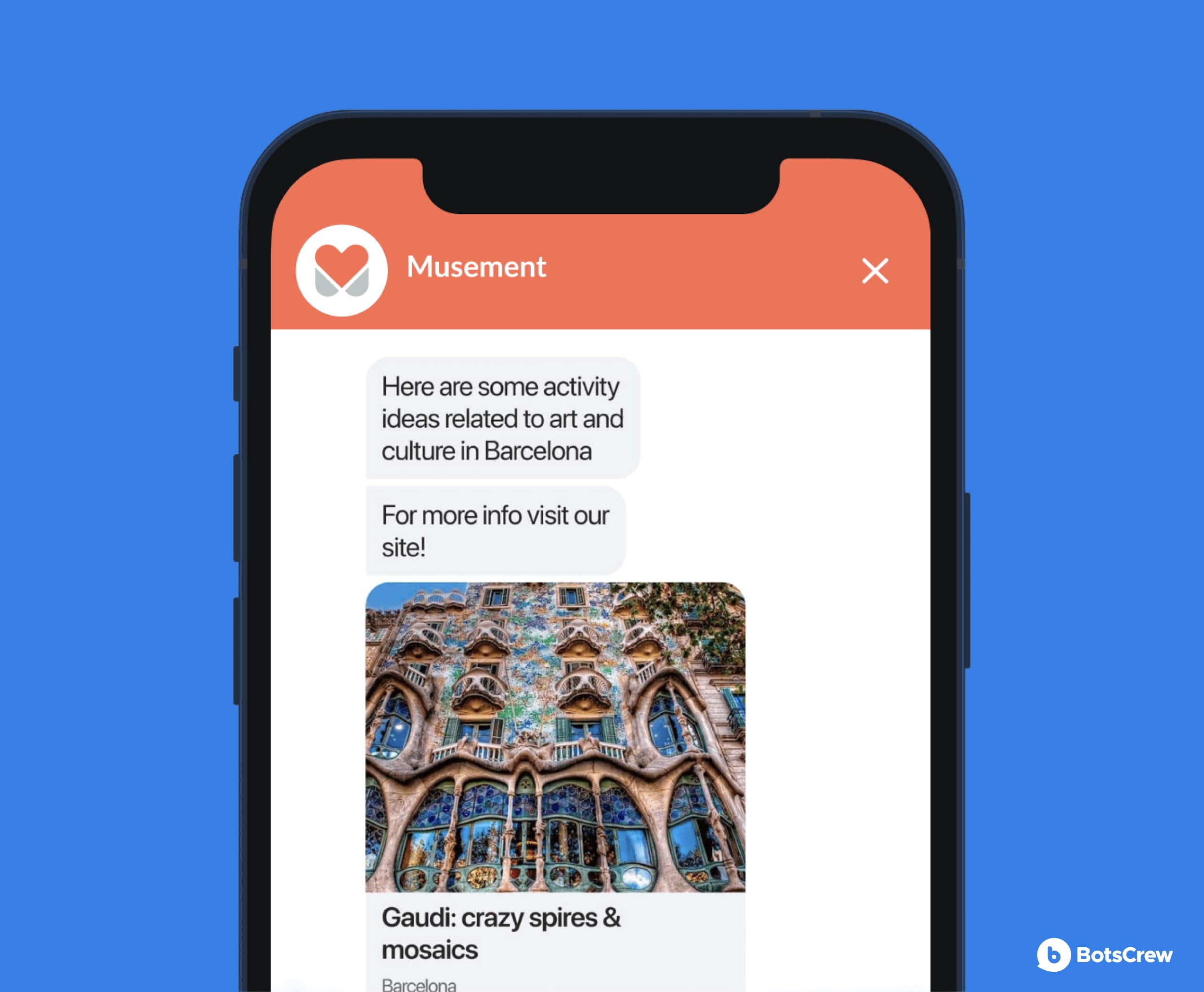
Automated Travel Companion
Navigating an airport can be stressful, especially when juggling multiple apps for flights, food, and health requirements. Automated travel companions turn this fragmented experience into a seamless journey.
Instead of switching between platforms, travelers can rely on a single AI-powered assistant to plan trips, access real-time flight information, receive notifications, submit health forms, and even order meals — all from one place. The system can adapt dynamically, ensuring travelers have everything they need at their fingertips, whether before departure, during the flight day, or at their destination.
For example, we've been engaged in developing a conversational platform — accessible via web and SMS — that serves as a personal airport guide for a NYC-based tech startup (NDA). Designed to integrate with airports, merchants, and service providers, the platform simplifies every stage of the traveler's journey.
Users can:
- Access real-time flight details, subscribe for instant notifications, and stay informed about changes.
- Navigate the airport, finding gates, restaurants, restrooms, and shops through step-by-step guidance.
- Order food seamlessly, whether by locating dining options or placing an order directly from the platform.
- Complete essential tasks, such as submitting health forms, providing feedback, and entering sweepstakes.
The platform turned a fragmented, stressful airport experience into a connected, intuitive, and safe journey. For airports and partners, it's a game-changer: enabling personalized engagement, higher customer satisfaction, and new revenue opportunities through integrated services and promotions.
Frictionless Check-In and Check-Out
Say goodbye to front-desk queues. Hotels are embracing contactless check-in and check-out powered by AI, facial recognition, and mobile key access. Guests can head straight to their rooms without key cards or staff assistance. Beyond convenience, these systems boost security and personalization.
Travelers can pre-select rooms, customize preferences, and get real-time updates via hotel apps. AI even predicts check-out times and automates billing for a hassle-free departure. Hilton's Digital Key lets guests check in, pick their rooms, and unlock doors through the Hilton Honors app.
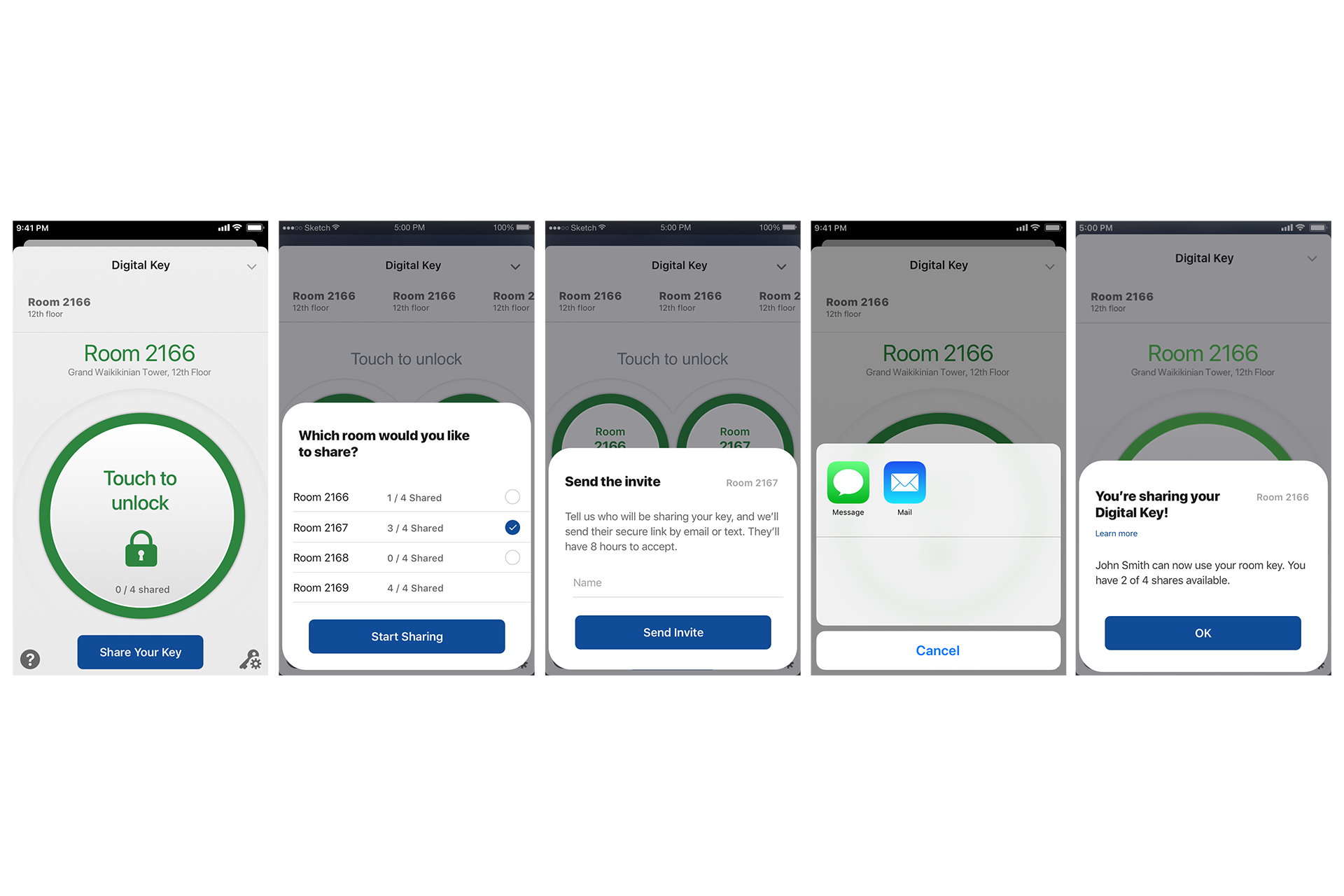
Smarter Pricing & Real-Time Adjustments
In the travel industry, static pricing models are a thing of the past. AI-driven dynamic pricing adjusts rates in real-time based on demand, competitor prices, and booking trends. By analyzing market conditions, traveler behavior, and seasonal patterns, AI ensures businesses offer the right price at the right moment, maximizing revenue while keeping rates competitive.
Airbnb's Smart Pricing tool automatically updates nightly rates based on demand, seasonality, and local events, helping hosts boost occupancy and profitability.
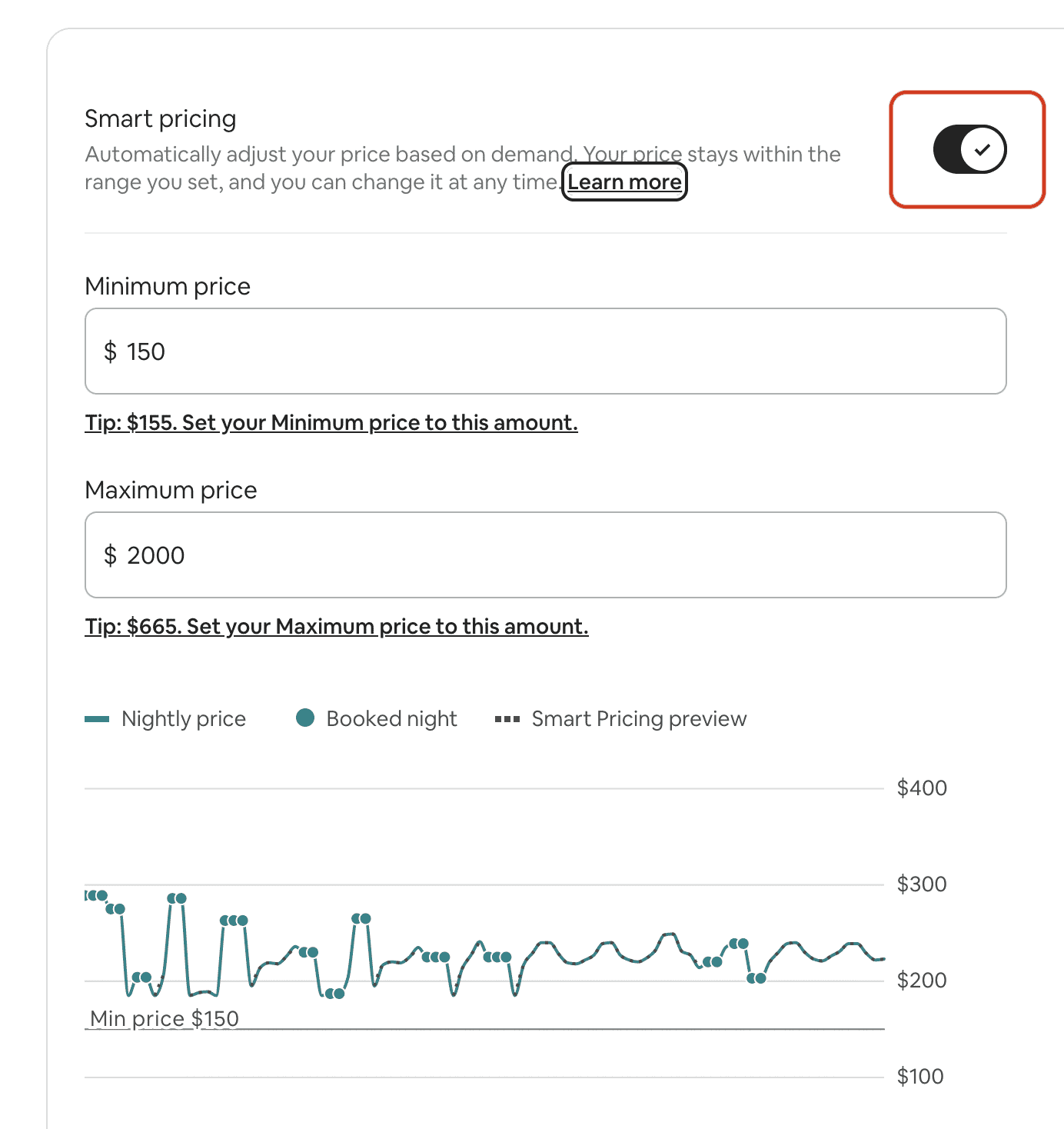
Personalized Travel Upgrades
The right upgrade can transform a trip, but irrelevant offers often feel intrusive. AI solves this by analyzing a traveler's itinerary, preferences, and budget to recommend relevant upgrades, such as seat upgrades, premium hotel rooms, rental cars, or curated local experiences.
For instance, Booking.com uses an AI-powered recommendation engine to suggest room upgrades, rental cars, and local attractions based on past searches and real-time booking data.
Virtual Coaching and Training
Advanced simulation models connected to real-time data are transforming how travel and hospitality companies train and support their teams. Imagine a front-desk employee at a busy resort during peak season — handling check-ins, resolving last-minute booking issues, and answering guest questions in multiple languages.
Traditionally, this level of preparedness takes weeks of training. With AI-powered virtual coaching, employees can practice real-life scenarios in a safe, interactive environment — from managing overbookings to providing personalized upsell recommendations.
McKinsey research shows that emerging technologies, including generative AI, are cutting down training times and accelerating skill development. VR and AR can immerse frontline staff — tour guides, group leaders, or concierge teams — in realistic situations, while AI-powered assistants deliver personalized coaching based on individual performance. This way, teams hit the ground running, ready to provide exceptional service with confidence and efficiency.
Demand Analysis & Forecasting
Intelligent reservation systems continuously monitor real-time booking data and demand patterns. AI dynamically allocates rooms to optimize occupancy rates, ensuring minimal underutilization and better inventory management.
Furthermore, AI-powered forecasting analyzes historical data, market trends, and seasonal patterns to predict demand accurately. This empowers hotels to adjust pricing strategies, allocate resources effectively, and stay ahead of market fluctuations.
Visa & Document Processing
Visa applications and document checks are traditionally slow and paperwork-heavy. AI changes that by analyzing passenger documents, facial recognition data, and biometrics in real-time. Automated verification reduces errors, flags security risks, and slashes processing times, making international travel smoother for passengers and border control alike.
Dubai International Airport's "Travel Without Borders" uses AI-powered facial recognition to verify identities across the terminal, removing the need for manual passport checks or physical documents.
Wondering if your company is truly ready for AI?
Take our quick 8-question assessment to find out. You'll get personalized insights plus a free 30-minute strategy session with our AI experts.
AI Trends in the Travel Industry For 2025 and Beyond
The travel industry is on the cusp of massive transformation. According to the International Air Transport Association (IATA), the number of air passengers is expected to rise from 4 billion today to nearly 8 billion by 2036.
To meet growing demand and rising customer expectations, the industry is leaning into artificial intelligence. And the numbers say it all:
- AI in tourism is projected to grow from $2.95 billion in 2024 to $13.38 billion by 2030.
- AI in hospitality is forecasted to surge from $16.33 billion in 2023 to $70.32 billion by 2031.
We are still just scratching the surface of what AI can do. Here is what's next:
Voice and Visual Search Integration
AI-powered travel chatbots are already common — but the next wave is voice and visual search, especially with OpenAI's RealTime Voice API.
Instead of navigating websites, travelers can speak to a voice assistant to book trips or build itineraries. Visual search takes personalization even further. A customer uploads an image of a destination they love, and the system finds similar locations that match their preferences and budget.
Reasons for using voice search (Source: Contentstack):
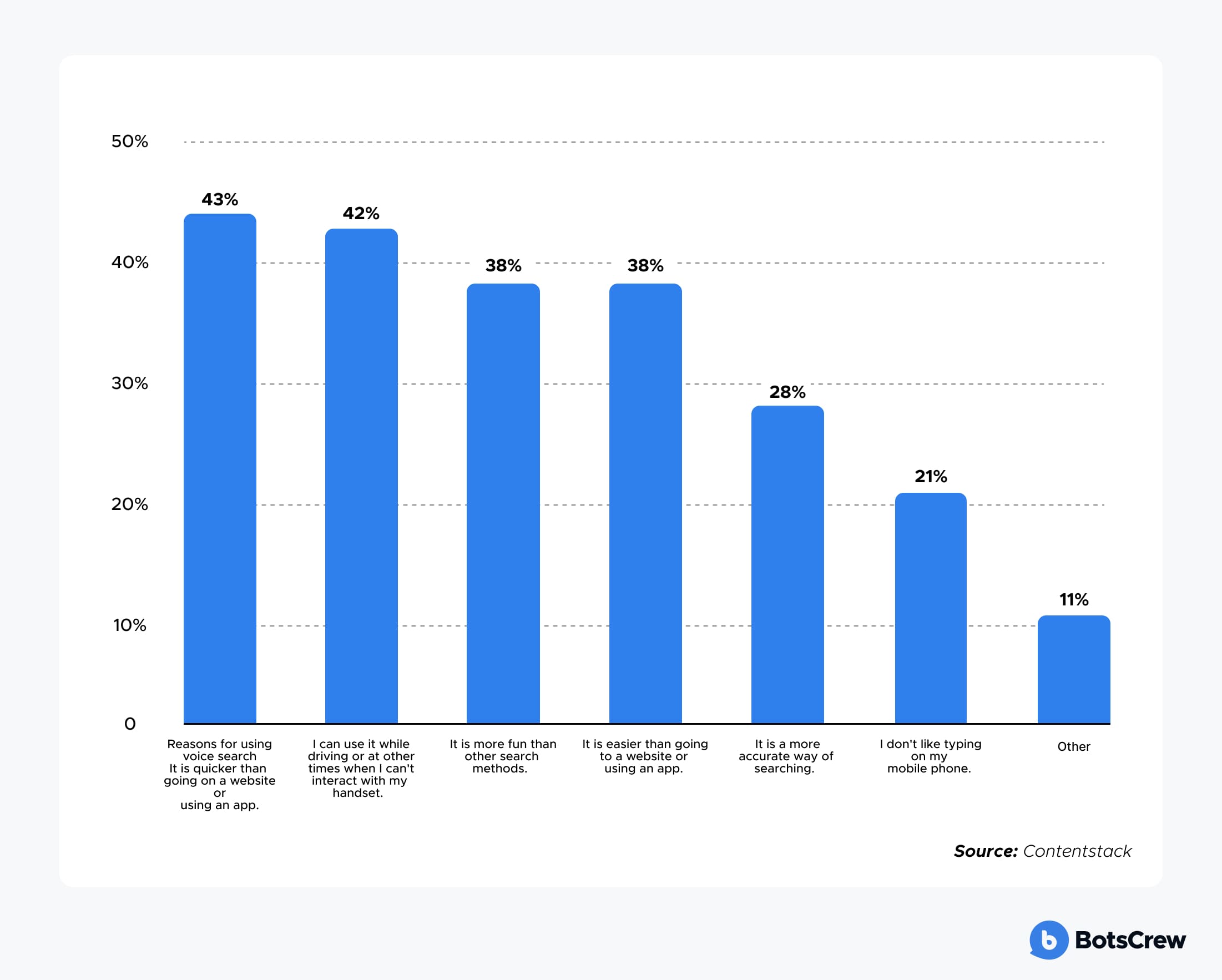
Emotion AI and Sentiment-Aware Services
How does your guest really feel? AI can now tell. Using facial recognition and voice analysis, emotion AI detects stress, frustration, or dissatisfaction in real time. If a guest seems upset, the system alerts hotel staff immediately, allowing them to step in before a complaint escalates.
Travel Is Ripe for Innovation — But It Won't Happen by Itself
The travel industry is projected to grow at an average of 5.8% annually through 2032. But that doesn't mean companies can sit back and expect success. Growth will favor businesses that embrace innovation, rethinking how they engage customers, deliver services, and empower their teams.
AI and other emerging technologies are key to unlocking this opportunity. To avoid getting stuck in complexity, partner with an AI development company that knows how to turn challenges into opportunities.
The right partner can:
✔️ Ensure regulatory compliance with robust data governance and security frameworks
✔️ Bridge the gap between old infrastructure and new intelligence
✔️ Develop a clear ROI roadmap with measurable business outcomes
✔️ Clean and centralize data to improve model accuracy and trustworthiness.
BotsCrew is a trusted AI development partner for travel and hospitality companies looking to harness the power of AI without the usual headaches. We help businesses navigate the everyday challenges of AI adoption by delivering tailored, end-to-end solutions.
Our team designs, builds, and integrates intelligent chatbots in the hospitality industry, complex AI agents, and automation tools that streamline operations, enhance guest experiences, and empower staff to focus on high-value tasks.
Ready to Elevate Your Hospitality Brand with AI? With 7+ years of expertise, BotsCrew delivers smart, scalable AI solutions designed for hotels, airlines, and travel services.




